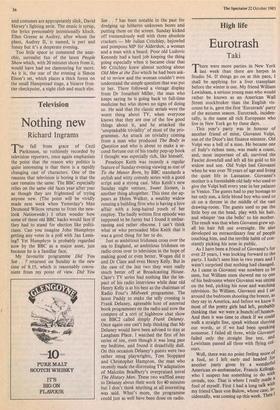Television
Nothing new
Richard Ingrams
The fall from grace of Cecil Parkinson, so ruthlessly recorded by television reporters, once again emphasises the point that the reason why politics is quite interesting is that there is a rapidly changing cast of characters. One of the reasons that television is boring is that the cast remains the same. The BBC especially relies on the same old faces year after year as though they are frightened of trying anyone new. (The point will be vividly made next week when Yesterday's Man Desmond Wilcox returns to front the new- look Nationwide.) I often wonder how some of these old BBC hacks would fare if they had to stand for election like politi- cians. Can you imagine John Humphrys getting any votes in a poll with Jan Leem- ing? Yet Humphrys is probably regarded now by the BBC as a major asset, just because he is a familiar face. My favourite programme Did You See. . ? returned on Sunday at the new time of 8.15, which is reasonably conve- nient from my point of view. Did You See . ? has been notable in the past for dredging up hitherto unknown bores and putting them on the screen. Sunday kicked off tremendously well with three absolute crackers — Mr Julian Critchley, bejowled and pompous MP for Aldershot, a woman and a man with a beard. Poor old Ludovic Kennedy had a hard job keeping the thing going especially when it became clear that Mr Critchley knew almost nothing about Old Men at the Zoo which he had been ask- ed to review and the woman couldn't even understand the simple question that was put to her. There followed a vintage display from Dr Jonathan Miller, the man who keeps saying he is going back to full-time medicine but who shows no signs of doing so. He said that the classic serials were the worst thing about TV, when everyone knows that they are one of the few good things about it, and he attacked the 'unspeakable triviality' of Most of the pro- grammes. An attack on triviality coming from a man who produced The Body in Question and who is about to make a se- cond fortune out of his trashy pop-up book I thought was especially rich, like himself. Penelope Keith was recently a regular 'feature of Sunday evening viewing as star of To the Manor Born, by BBC standards a stylish and witty comedy series with a good script and a strong cast. Miss Keith's new Sunday night venture, Sweet Sixteen, is another thing altogether. This time she ap- pears as Helen Walker, a wealthy widow running a building firm who is having a love affair with a long-haired youth of her employ. The badly written first episode was supposed to be funny but I found it embar- rassing and rather obscene. I can't think what or who persuaded Miss Keith that it was a good thing for her to do. Just as ambitious Irishmen cross over the sea to England, so ambitious Irishmen on radio cross over to television in the hope of making good or even better. Wogan did it and Dr Clare and even Henry Kelly. But in the case of the last two they were really much better off at Broadcasting House. Clare's TV series had nothing like the im- pact of his radio interviews while dear old Henry Kelly is at his best as the chairman of Radio Four's Midweek programme. The latest Paddy to make the telly crossing is Frank Delaney, agreeable host of assorted book programmes on the radio and now the compere of a sort of highbrow chat show on BBC2 called simply Frank Delaney. Once again one can't help thinking that Mr Delaney would have been advised to stay at Langham Place. I watched the first of his series of ten, even though it was long past my bedtime, and found it dreadfully dull. On this occasion Delaney's guests were two rather smug playwrights, Tom Stoppard and Christopher Hampton, the man who recently made the distressing TV adaptation of Malcolm Bradbury's overpraised novel The History Man. These two waffled away to Delaney about their work for 40 minutes but I don't think anything at all interesting was said. What's more, the programme could just as well have been done on radio.














































 Previous page
Previous page